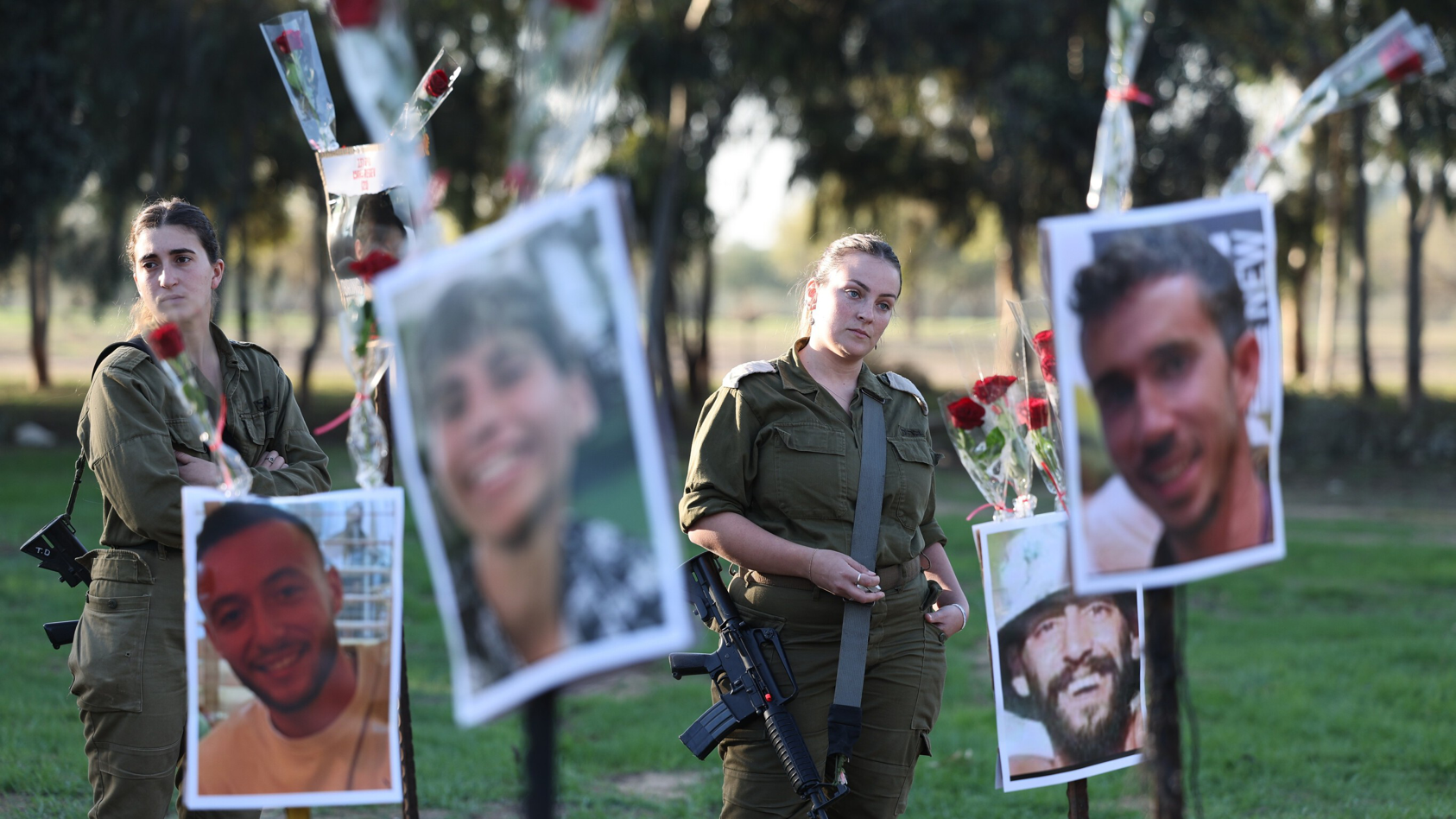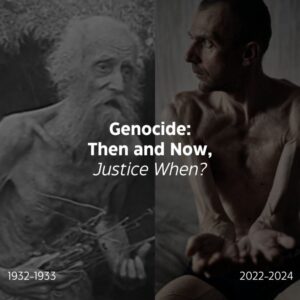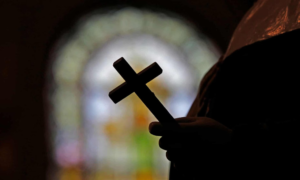The terrorists were ‘on a mission’ to carry out sexual attacks on October 7. Campaigners have asked why the UN stayed silent
She had, he says, the face of an angel. Night after night Yoni Saadon, 39, wakes in anguish to the faces of women.
First, that of the young woman hiding next to him under the stage of the Supernova festival where he had been dancing to electronic music as the sun rose on October 7 and Hamas militants opened fire.
“She fell to the ground, shot in the head, and I pulled her body over me and smeared her blood on me so it would look as if I was dead too,” he said. “I will never forget her face. Every night I wake to it and apologise to her, saying ‘I’m sorry’.”
After an hour, he peeked out. “I saw this beautiful woman with the face of an angel and eight or ten of the fighters beating and raping her. She was screaming, ‘Stop it — already I’m going to die anyway from what you are doing, just kill me!’ When they finished they were laughing and the last one shot her in the head.
“I kept thinking it could have been one of my daughters,” added the father of four. “Or my sister — I had bought her a ticket but last minute she couldn’t come.”
The horror did not end there. Hiding in bushes, he saw two more Hamas fighters. “They had caught a young woman near a car and she was fighting back, not allowing them to strip her. They threw her to the ground and one of the terrorists took a shovel and beheaded her and her head rolled along the ground. I see that head too,” he says.
Saadon, a shift manager in a foundry, told his story to The Sunday Times in a support area set up in Sitria, southeast of Tel Aviv, for survivors of the festival.
Three times a week survivors from around Israel get together with parents whose children were among those slaughtered. On Wednesday evening they gathered on sofas as people brought them beers and steaming bowls of vegetable soup, then went outside to sit round a firepit as the singer Rona Kenan strummed her guitar and sang ballads.
Volunteer therapists on hand included Bar Yuval-Shani, 58, who lost her only sister, Deborah, and brother-in-law, Shlomi Matias, both musicians and peace activists, killed on Holit kibbutz by militants who broke into their safe room. “She was eight years younger but [it was] as if we were twins,” she said tearfully. “I held all her secrets and I miss her terribly.”
Deborah died shielding her son Rotem, 16, who was shot in the abdomen then hid for nine hours as fighters returned again and again, and Yuval-Shani guided him over the phone in how to treat himself.
Yoni Saadon’s account is one of several witness accounts of rape Yuval-Shani has heard from festival survivors, all of whom, she says, are “deeply traumatised”.
Eight weeks after the attack in which 1,200 were killed and 240 taken hostage, there is mounting evidence of widespread rape on October 7. Israeli police have begun their biggest investigation into sexual violence and crimes against women. “It’s clear now that sexual crimes were part of the planning and the purpose was to terrify and humiliate people,” says Shelly Harush, the police commander leading the investigation.
They have collected thousands of statements, photographs and video clips, which she says “as a Jewish mother the mind and soul cannot bear”, including “girls whose pelvises were broken they had been raped so much”.
The first indications came on the day itself when Hamas livestreamed some of the horrors it was perpetrating. Footage showed several women stripped of their clothing. One video showed a young woman with bloodstains on the crotch of her underwear.
“We didn’t understand at first,” says Dr Cochav Elkayam-Levy, an expert on international law who heads a civilian commission into Hamas crimes against women on October 7. Survivors arriving at hospitals were not asked about sexual abuse or given rape kits for evidence.
However, those tasked with collecting the bodies began reporting that many of the women were naked and bleeding from the genitals.
Haim Outmezgine, commander of a special unit of Zaka, a voluntary religious organisation that collects the remains of the dead, including their blood, so they can be buried in accordance with Jewish tradition, has no doubt about what they saw.
“We collected 1,000 bodies in ten days from the festival site and kibbutzim,” he said. “No one saw more than us. “It was clear they were trying to spread as much horror as they could — to kill, to burn alive, to rape … it seemed their mission was to rape as many as possible.”
He describes finding two girls’ bodies in a field, both shot in the head, legs apart, one with shorts ripped and shot in the vagina and other with jeans pulled down and bruises on her legs. A father of six, he finds it hard to talk about. “One of my girls is 24, around the same age,” he says. His team are all receiving therapy.
Once the bodies were collected they were taken to the main morgue at the Shura military base to be identified and prepared for burial. Among volunteers in an all-female team to prepare female corpses was Shari, 60, an architect who lives in Jerusalem.
Working there day and night for two weeks starting the morning after, she describes scenes of unimaginable horror. “This is a huge building but there were literally body bags filling every room and lining corridors floor to ceiling, all oozing liquids.
“Opening the body bags was scary as we didn’t know what we would see. They were all young women. Most in little clothing or shredded clothing and their bodies bloodied particularly round their underwear and some women shot many times in the face as if to mutilate them.
“Their faces were in anguish and often their fingers clenched as they died. We saw women whose pelvises were broken. Legs broken. There were women who had been shot in the crotch, in the breasts … there seems no doubt what happened to them.”
Her team had to wait while doctors, dentists and DNA experts worked to identify the bodies before they could then gently put them in white linen burial shrouds. “We are just normal women not doctors, we never expected to see such horrors,” she said. Yet what really made them cry was the occasional flash of colour. “Some bodies we took out had pretty pink or bright purple nails — and we would all pause and at that point many of us broke down.”
As more and more reports emerged, Elkayam-Levy was shocked at the lack of international reaction from bodies such as UN Women. On the eighth day she gathered a group of international law and women’s rights experts, including 160 law professors, and drafted letters to UN agencies sharing everything.
The initial response, she says, was silence. “It was absurd that it was so documented yet accompanied by so much silence. One of the UN’s own values is ‘believe women’ as crimes against women are always denied but they failed to believe us — the very organisations meant to protect us failed us.”
The women established a civilian commission to collect videos, photos, and witness statements into a database, both as an archive but also to raise international awareness.
Elkayam-Levy says these make clear what Hamas was trying to achieve. “They wanted to terrorise us for generations to come and instil in us insecurity in the most basic way, and that’s why they targeted women in this way.
⬤ Janice Turner: Why’s the #MeToo crowd silent on Hamas rape?
“I’m a feminist,” she adds, “I teach and fight for women’s rights, yet after October 7 I told my husband to get a gun. For me to want a weapon and put it in my house — against everything I believe in and ever believed in — shows what they did to us.”
Israel Defence Forces (IDF) sources claim that Hamas fighters captured in Gaza have told them in interrogations that they were instructed to “dirty” or “whore” the women. They also showed The Sunday Times photographs and footage not previously seen and too graphic to publish.
Some have questioned the accounts because of the IDF use of propaganda and the fact no victims have come forward. But Dr Dvora Baumann, director of the Bat Ami Centre for Victims of Sexual Abuse at Hadassah hospital, points out: “Usually people who are sexually abused don’t report it for a long time because it is so hard to talk about and they worry they will be judged. We have plenty of other evidence. I’ve been in this field over 20 years and I have never heard such horrific things.”
Most of the women are believed to have been killed or taken hostage. There are reports some survivors of the festival survivors have taken their own lives, while 18 are receiving treatment in mental institutions.
Some fear that those remaining are being held as sex slaves by Hamas commanders in the same way as Islamic State (Isis) did with Yazidis in 2014.
Paradoxically, in a world where rape is being used as a weapon of war everywhere from Ethiopia to Ukraine, this had been cited as one conflict where it did not happen.
Hamas denies that its fighters rape women. One official, Basem Naim, told The Washington Post that the group considers “any sexual relationship or activity outside of marriage to be completely haram” — forbidden by Islam.
Palestinian women say they too have suffered sexual violence in Israeli jails, a claim denied by Israeli officials.
The International Criminal Court has announced it will investigate the October 7 attacks and the situation in Gaza where about 15,000 people have been killed and fighting resumed on Friday. Karim Khan, the chief prosecutor, has spent the last two days in Israel meeting survivors and hostage families in Tel Aviv and visiting the West Bank. “We will investigate crimes within our jurisdiction … depending on the information we have and evidence potentially available,” he said. This is expected to include sexual violence.
For the past week, a delegation of Israeli feminists and human rights experts have been in Geneva and New York lobbying to be heard. Tomorrow they will protest outside the UN headquarters, and Sheryl Sandberg, the former chief operating officer of Facebook, will speak.
On Friday night UN Women finally issued a statement condemning the October 7 attacks. “We are alarmed by the numerous accounts of gender-based atrocities and sexual violence during these attacks,” it said.
Professor Ruth Halperin-Kaddari, who spent 12 years as a committee member on the UN convention on the elimination of all forms of discrimination against women (Cedaw), said: “This is the statement they should have issued two months ago.
“It’s mindblowing. We were there for our sisters when terrible things happened across the ocean, when they took away abortion rights in US, the killing of women in Iran, the abduction of Yazidis … but with us they looked away and I can’t think of a reasonable answer.”
Ayelet Razin Bet Or, the former director of Israel’s authority for the advancement of the status of women, does have an answer. “Israeli women have been betrayed,” she said. “What they are saying is MeToo except if you’re a Jew.”




